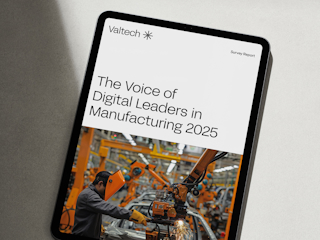November 13, 2024
The manufacturing sector is going through a digital revolution with composable commerce — a flexible, modular approach that breaks down complex systems into customizable components — at the heart of it. Recently, experts from Valtech and commercetools gathered for a live webinar to discuss the impact of composable commerce on the B2B manufacturing sector. Dive into our article to discover the key insights and takeaways.
The growing demand for digital solutions in manufacturing
Now valued at nearly $18.7 billion, the booming global B2B commerce market reflects the expanding role of digital transformation in manufacturing. With this growth, however, comes an urgent need for manufacturers to differentiate themselves in a competitive landscape. Julia Rabkin, Senior Product Marketing Manager for B2B at commercetools, highlighted the sheer scale of the opportunity: “E-commerce is vital for manufacturers to stay competitive and stand out in that giant market.”
Adding to this perspective, Herbert Pesch, Global Vertical Lead B2B at Valtech, emphasized that “Manufacturers are focusing on digital transformation not only to boost revenue but also to improve operational efficiency, streamline customer experiences and increase margins.” This trend is an important takeaway from our The Voice of Digital Leaders in Manufacturing 2024 Report.
These developments are essential in a market where both clients and employees expect accessible, user-friendly digital solutions. Many manufacturers are taking the approach to integrate e-commerce capabilities with digital services, often in the form of customer portals that unify multiple aspects of the customer experience.
Why composable commerce?
At the heart of the discussion was the question of why composable commerce is especially well-suited to the unique demands of B2B manufacturing. Composable commerce allows manufacturers to deliver custom solutions with the speed and agility that traditional, monolithic platforms simply can’t match. Martin Eggers, Director of E-commerce at Ingersoll Rand (a multinational industrial manufacturer) shared his view of this approach in action, explaining, “The customer journey needs to be simple, guided by what the customer needs today, not by our internal structures.”
A composable approach enables teams to launch new features, roll out updates and adapt to customer demands at a pace that was once considered impossible. Eggers emphasized the impact this has had on Ingersoll Rand, noting, “Our latest composable project has halved the implementation time compared to previous projects.”
For manufacturers, the benefits of composable commerce are clear: its modular structure allows teams to integrate new features or services without disrupting the entire platform. This adaptability is critical in B2B contexts, where each customer may require a tailored experience based on specific products, services or industry needs. By building solutions that are composable from the ground up, manufacturers gain the ability to respond swiftly to market changes, customer feedback and emerging technology trends. With composable commerce, manufacturers can make targeted updates that meet customer expectations without the costly and time-consuming process of replatforming.
Enabling incremental innovation
One of the greatest benefits of composable commerce is the ability it offers for incremental innovation. In the B2B space, where processes and client relationships are often deeply integrated, the flexibility to test, iterate and gradually build out solutions is invaluable. Dennis Houtzager, Customer Portal Expert Valtech B2B, introduced this concept as “incremental innovation,” describing how it allows teams to explore new possibilities without committing to major system overhauls.
At Valtech, Dennis and his team have observed that incremental innovation empowers cross-functional teams to deliver solutions that are highly responsive to customer needs. By creating a culture where small-scale testing is not only encouraged but facilitated by modular architecture, businesses can quickly identify and scale successful innovations. This capability is particularly impactful for manufacturers, who are increasingly looking to provide unique and engaging digital experiences for their clients.
Martin Eggers further explained the practical benefits of this modular approach, sharing that at Ingersoll Rand, they’ve seen a significant reduction in project timelines and a more efficient collaboration between departments. By utilizing composable technology, the company has been able to “try new solutions, test quickly and make changes as needed,” which has led to faster product cycles and enhanced alignment across teams.
Improving customer experience
Customer expectations have evolved significantly, with B2B clients now demanding the same level of personalization and responsiveness they experience as B2C consumers. In this environment, composable commerce presents a way to deliver hyper-personalized and responsive customer journeys. This capability is invaluable for manufacturers whose clients often require unique product configurations, custom pricing and tailored support.
Martin Eggers highlighted the ways composable solutions have helped Ingersoll Rand meet these customer demands: “Each customer can have a different journey depending on their specific needs, and we’re able to make adjustments without disrupting the whole platform.” This ability to customize without extensive back-end changes creates a smoother, more personalized experience that strengthens customer relationships. In a competitive B2B landscape, delivering such a high level of tailored service can set a business apart and foster long-term loyalty.
Dennis Houtzager also noted that composable commerce allows companies to respond to feedback in real-time, creating a more dynamic, customer-centric approach to service. “The B2B customer expects the same seamless experience they get as a B2C customer, but with added layers like personalized account information and order history,” he shared. For manufacturers, this means they can design portals and platforms that not only simplify the ordering process but also provide robust, user-friendly tools that make clients’ lives easier.
A collaborative approach
One of the keys to success in composable commerce implementations is effective cross-functional collaboration. B2B projects often span multiple departments and require input from stakeholders across marketing, IT, sales and customer service. Martin Eggers stressed the importance of this collaborative approach at Ingersoll Rand: “Each segment has ownership of their part, and we bring in the relevant teams from marketing, IT and sales to ensure the solution is aligned across functions.”
This level of collaboration enables a more holistic approach to digital transformation, ensuring that every team’s unique perspective is considered. By empowering different departments to own pieces of the project, businesses can drive faster decision-making and foster a sense of shared purpose. Dennis Houtzager also noted that this cross-functional collaboration is foundational to successful composable commerce projects, helping manufacturers build solutions that are both effective and aligned with broader business goals.
The future of B2B and composable
Looking to the future, composable commerce is set to play an even greater role in helping manufacturers stay competitive. As new technologies such as AI and machine learning become more accessible, B2B companies are finding ways to integrate these tools into their composable stacks, driving smarter decision-making and more personalized customer interactions. Anastasia Drougka Composable Commerce Lead at commercetools, remarked on this trend, stating, “AI-powered insights will help B2B companies better understand their customers and make more predictive, proactive decisions in real-time.”
Dennis Houtzager also emphasized the growing role of automation in B2B commerce, particularly for areas like customer service, inventory management and order processing. “By leveraging composable commerce, businesses can integrate automation solutions without overhauling their entire systems,” he explained, noting that these tools streamline operations and ultimately improve the customer experience.
Martin Eggers summed up the future-facing potential of composable well: “B2B businesses are under constant pressure to innovate and adapt, and a composable approach gives us the flexibility to try new solutions, test quickly, and make changes as needed.”
Embracing composable commerce
For B2B manufacturers, a composable approach offers more than just an operational strategy; it represents a fundamental shift in how businesses approach innovation, customer experience and collaboration. As companies continue to prioritize digital transformation, composable commerce stands out as a solution that offers not only agility and customization but also a clear path toward sustainable growth and differentiation in a competitive marketplace.
To learn more about how B2B manufacturers are achieving faster time to market with composable commerce, watch our on-demand webinar.
Valtech combines best-of-breed technologies with data-driven insights and strategic industry know-how to create commerce experiences that convert. Explore our commerce acceleration offering.










